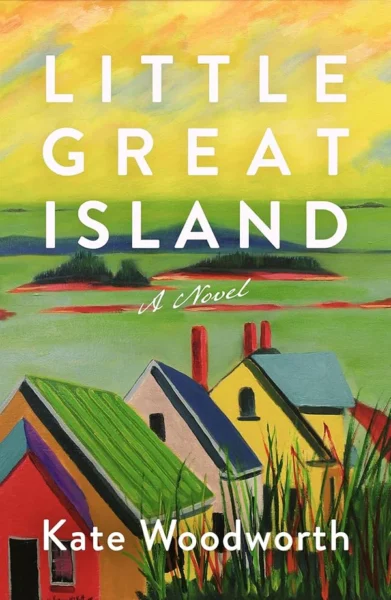A Novel, by Kate Woodworth
Sibylline Press, 2025
Reviewed by JoeAnn Hart

Our lives are like islands in the sea, or like trees in the forest… the trees commingle their roots in the darkness underground, and the islands hang together through the ocean’s bottom.
William James, psychologist and philosopher
Such is the case with all human and non-human beings living on Little Great Island off the coast of Maine: Everyone and everything are all tied together, for better or worse. In Little Great Island, Kate Woodworth explores not just the interconnectedness of the characters, but the natural ecology of the island as well, and how every decision has consequences all around.
Harry Richardson, one of the main characters, is mourning his wife, Ellie, as he arrives on the island to get the family summer home and its hundred acres ready for sale. A high school teacher, he has recently experienced a breakdown in class. “What Harry is left with is the understanding that grief is more than sadness. It’s a swamp that sucks you back just when you think the footing is firm.” Once on the island, he makes an island of himself, feeling he has nothing in common with either summer visitors or year-round residents. “They live a life insulated from true loss.”
Mari, another key character, was born on the island, but dropped out of college ten years before to join “Gods Bounty,” a cult in South Carolina, along with the man who would be her husband. They had fallen in love with one another and the regenerative farming methods of the cult, which used methods that reduced negative environmental impacts. Until they didn’t. The cult members believed that climate change was God’s will, and their world turns grim. So, Mari returns to Little Great Island with her five-year-old boy, Levi, and is not altogether welcome. Mari is bald, and has had no communication with the “heathen,” meaning her parents, since she left. Dad is “a softie hunkered down inside a solid shell,” but her mother is a barnacle “armored in a covering that can make you bleed.” Dad shares her bond with the natural world, his with the ocean, hers with the land.
Other characters are local business owners, and a retired diplomat, “the right hand of the Clintons,” who is selling his own home to ready himself for a retirement center in Boston. “Sooner rather than later, the island will be returned to what’s left of nature, but he won’t be here to see it.” All have a great interest the Richardson house and acreage, especially when a venture capital firm wants to buy it to create an executive retreat with the promise of lifting the island economy. The lobster industry is dying because the waters are getting warmer and higher, as the lobsters retreat north and rising waters ruin the docks. The young people are moving off the island and the future looks bleak.
Mari sees another future for the island, but the obstacles are many. She has no money, and her husband and the pastor of the cult are after her and her son. “The whole world has gone selfish, and now she’s got to figure out how to change at least a tiny piece of that.” Woodworth stops now and again to give the reader a deep sense of this island. “August settles onto Little Great Island. Bees, butterflies, ants, and beetles move from here to there, leaving pollen grains in the wake. Crows holler, seagulls complain, a bald eagle lands for breakfast on the carcass of of a fawn revealed by the ebbing tide…. The buckthorn spreads here. The garlic mustard spreads there. A spider descends a filament to examine its most recent catch.”
Harry and Ellie form an unlikely bond, as they build trust in order to create something new. Ellie tells him that “you learn the same thing growing up on an island that you do in a Christian farming ministry: It’s always easier not to do things alone.” And there-in lies the lesson to be had in these days of environmental degradation and climate change: Whether we can change the trajectory of the planet at this point is up for grabs, but we can all learn to co-exist with one another and the natural world.
JoeAnn Hart writes about the pervasive and widespread effects of the climate crisis on the natural world and the human psyche. Her most recent book, Arroyo Circle, a story of reclamation in a time of loss, was released by Green Writers Press in 2024. Her other books include the prize-winning environmental and animal fiction collection Highwire Act & Other Tales of Survival, the crime memoir Stamford ’76: A True Story of Murder, Corruption, Race, and Feminism in the 1970s, as well as Float, a dark comedy about plastics in the ocean published by Ashland Creek Press, and Addled, a social satire. She is a regular reviewer of climate and animal fiction at EcoLit Books.
